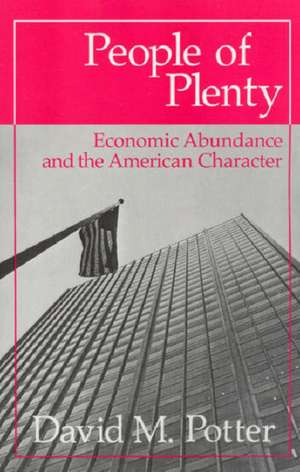People of Plenty: Economic Abundance and the American Character: Walgreen Foundation Lectures
Autor David M. Potteren Limba Engleză Paperback – 15 oct 1958
America has long been famous as a land of plenty, but we seldom realize how much the American people are a people of plenty—a people whose distinctive character has been shaped by economic abundance. In this important book, David M. Potter breaks new ground both in the study of this phenomenon and in his approach to the question of national character. He brings a fresh historical perspective to bear on the vital work done in this field by anthropologists, social psychologists, and psychoanalysts.
"The rejection of hindsight, with the insistence on trying to see events from the point of view of the participants, was a governing theme with Potter. . . . This sounds like a truism. Watching him apply it however, is a revelation."—Walter Clemons, Newsweek
"The best short book on national character I have seen . . . broadly based, closely reasoned, and lucidly written."—Karl W. Deutsch, Yale Review
"The rejection of hindsight, with the insistence on trying to see events from the point of view of the participants, was a governing theme with Potter. . . . This sounds like a truism. Watching him apply it however, is a revelation."—Walter Clemons, Newsweek
"The best short book on national character I have seen . . . broadly based, closely reasoned, and lucidly written."—Karl W. Deutsch, Yale Review
Preț: 260.52 lei
Nou
Puncte Express: 391
Preț estimativ în valută:
49.86€ • 51.86$ • 41.16£
49.86€ • 51.86$ • 41.16£
Carte tipărită la comandă
Livrare economică 14-28 aprilie
Preluare comenzi: 021 569.72.76
Specificații
ISBN-13: 9780226676333
ISBN-10: 0226676331
Pagini: 248
Dimensiuni: 152 x 229 x 18 mm
Greutate: 0.23 kg
Editura: University of Chicago Press
Colecția University of Chicago Press
Seria Walgreen Foundation Lectures
ISBN-10: 0226676331
Pagini: 248
Dimensiuni: 152 x 229 x 18 mm
Greutate: 0.23 kg
Editura: University of Chicago Press
Colecția University of Chicago Press
Seria Walgreen Foundation Lectures
Notă biografică
David M. Potter (1910-1971) was a professor of history at Yale University and, at the time of his death, Coe Professor of American History at Stanford University.
Cuprins
Part I. The Study of National Character
I. The Historians and National Character
II. The Behavioral Scientists and National Character
Part II. Abundance and the Shaping of American Character
Introduction to Part II
III. The Nature of American Abundance
IV. Abundance, Mobility, and Status
V. Democracy and Abundance
VI. Abundance and the Mission of America
VII. Abundance and the Frontier Hypothesis
VIII. The Institution of Abundance: Advertising
IX. Abundance and the Formation of Character
Index
I. The Historians and National Character
II. The Behavioral Scientists and National Character
Part II. Abundance and the Shaping of American Character
Introduction to Part II
III. The Nature of American Abundance
IV. Abundance, Mobility, and Status
V. Democracy and Abundance
VI. Abundance and the Mission of America
VII. Abundance and the Frontier Hypothesis
VIII. The Institution of Abundance: Advertising
IX. Abundance and the Formation of Character
Index









